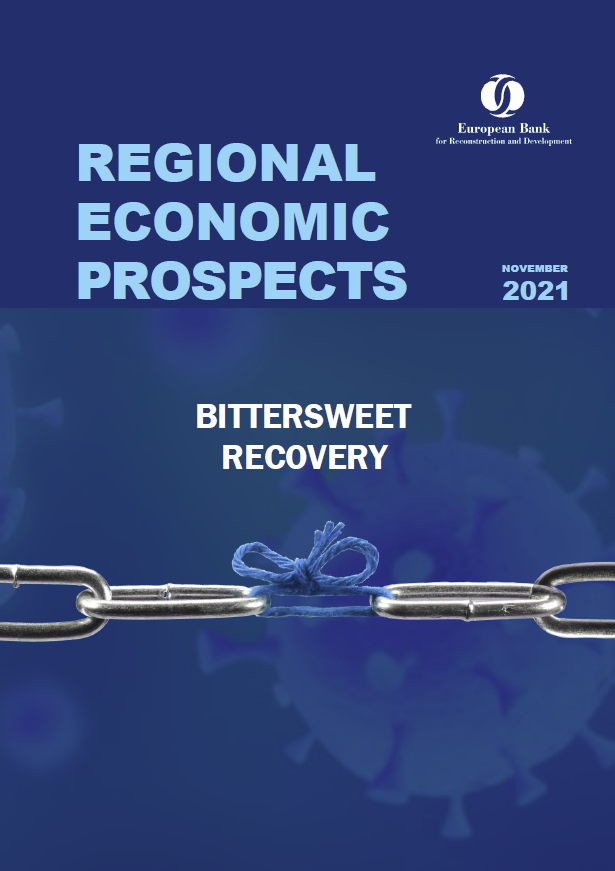
- Details
"The European Bank for Reconstruction and Development (EBRD) has raised its forecast for its regions for 2021 to 5.5 per cent in its latest Regional Economic Prospects report.
While this represents an upward revision of 1.3 percentage points over its June forecast following a strong performance in the first half-year, the Bank warns of serious threats ahead.
High commodity and energy prices, tight labour markets, supply chain disruption and currency depreciations in some EBRD economies have begun to push up inflation even before the latest spike in Covid-19 infection cases. On average, inflation in the EBRD regions exceeded its end of 2019 levels by 3 percentage points in September 2021. In response, a number of central banks in the EBRD regions have raised policy interest rates."

- Details
The EBRD Business Guide is an online platform for SMEs which employees of financial institutions will find useful when working with SME. The site provides information and resources on how SMEs have resolved challenges, legal information and tools. The resource offers a range of modules and templates on finance, strategy and planning, HR as well as checklists on digitalization, work safety and other.
Read more … EBRD Business Guide – an online platform for SMEs

- Details
COP26, or the 2021 United Nations Climate Change Conference, brought international stakeholders together to accelerate action towards the goals of the Paris Agreement and the UN Framework Convention on Climate Change. It's taking place in Glasgow.
"The stake are very high, as the climate emergency, highlighted in the IPCC report from earlier this year, requires urgent and decisive action from the world’s governments.
The climate emergency cannot remain an abstract notion but must become a strong driver of macroeconomic policy if we are to avoid the “hell of earth”.
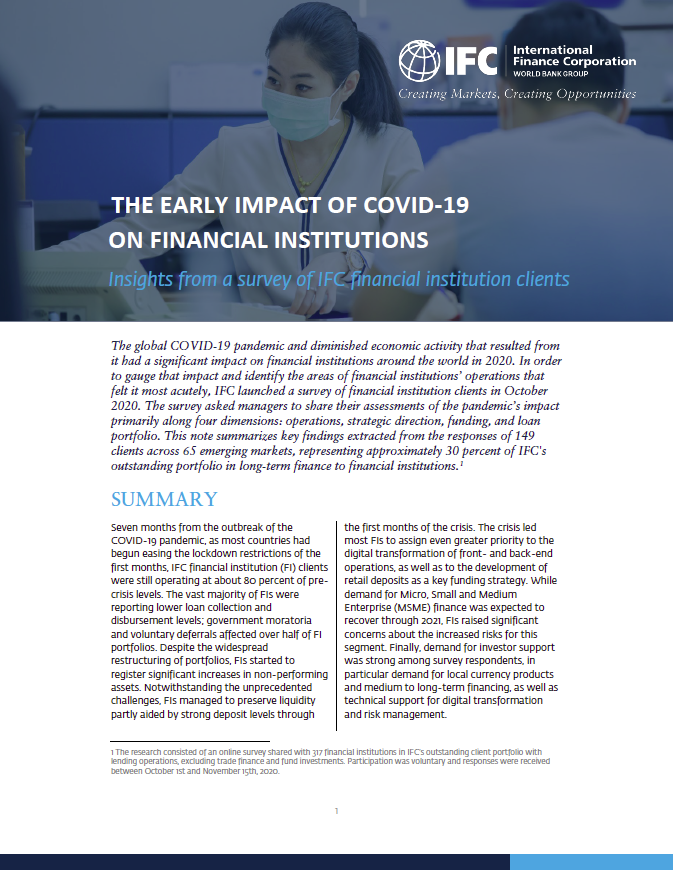
- Details
"The global COVID-19 pandemic and diminished economic activity that resulted from it had a significant impact on financial institutions around the world in 2020. In order to gauge that impact and identify the areas of financial institutions’ operations that felt it most acutely, IFC launched a survey of financial institution clients in October 2020. The survey asked managers to share their assessments of the pandemic’s impact primarily along four dimensions: operations, strategic direction, funding, and loan portfolio. This note summarizes key findings extracted from the responses of 149 clients across 65 emerging markets, representing approximately 30 percent of IFC's outstanding portfolio in long-term finance to financial institutions.
Read more … The Early Impact of COVID-19 on Financial Institutions

- Details
"The transition towards a low-carbon, climate-resilient economy is increasingly shaping business globally and across the economies where the EBRD invests. There is now broad recognition that climate change is a systemic source of risk to business and financial stability, and that companies need to strengthen their corporate climate governance in order to adjust to this shifting market context.
Read more … Gaps in climate disclosure will hit corporate access to capital
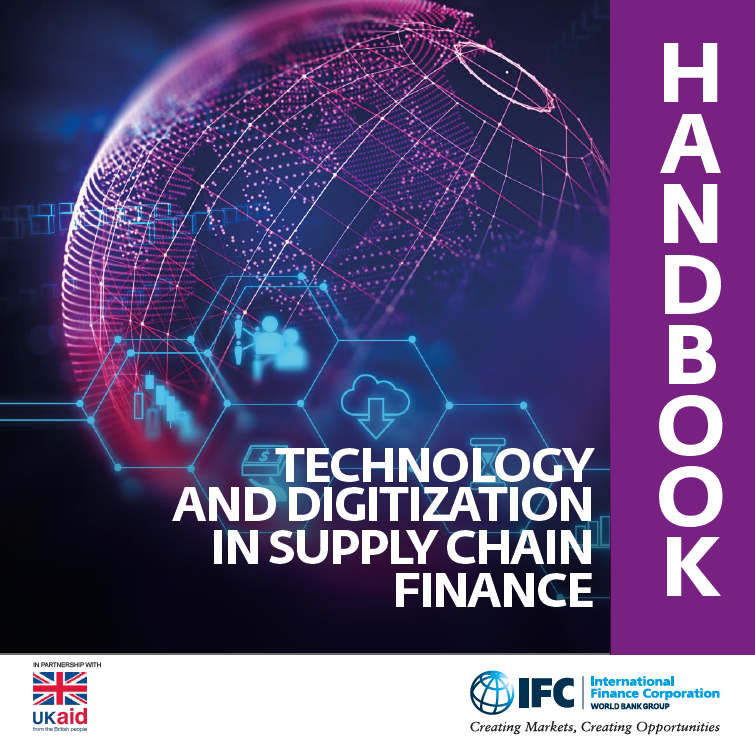
- Details
"Micro-, small-, and medium-sized enterprises face significant challenges in obtaining the financing and other resources they need to thrive. IFC, as a member of the World Bank Group, is committed to supporting these businesses by mobilizing private and public sector stakeholders to expand financial inclusion.
Digital integration of “traditional” retailers and distributors along supply chains can establish a pathway toward financial inclusion." This IFC handbook offers "expertise and lessons learned with financial institutions that seek to integrate traditional businesses into digital-banking networks.
Read more … Handbook - Technology and Digitization in Supply-Chain Finance
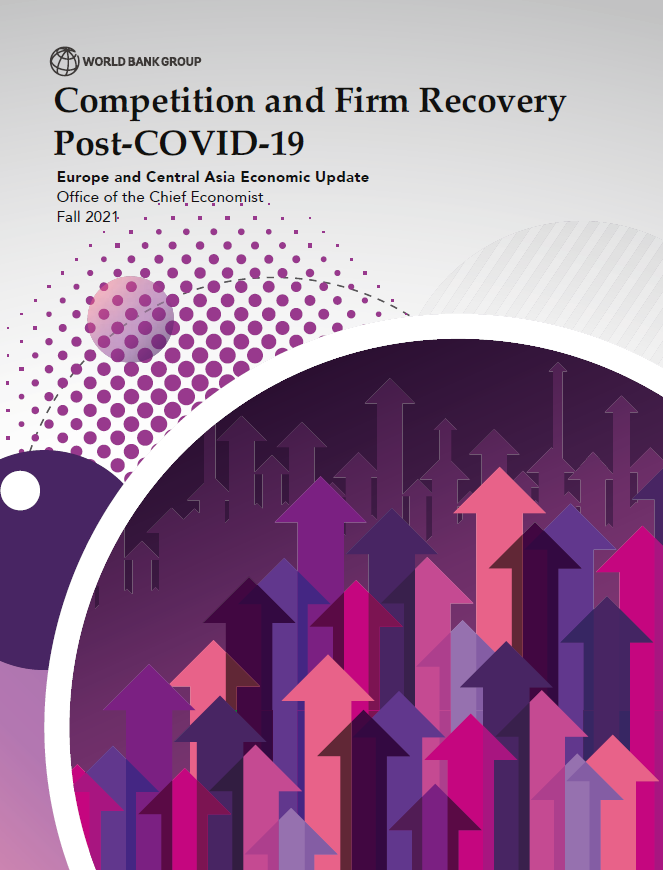
- Details
"Although global economic activity is recovering and output in Europe and Central Asia (ECA) is expected to grow in 2021, containing COVID-19 remains a challenge in the region. Enterprise survey data for the emerging and developing countries in the region show that COVID-19 had a profound and heterogeneous impact on firms. Smaller, younger, and female-run businesses were hit harder and had greater difficulty recovering. But the crisis also played a cleansing role and economic activity in ECA appears to have been reallocated toward more productive firms during the crisis, particularly in countries with more competitive markets.
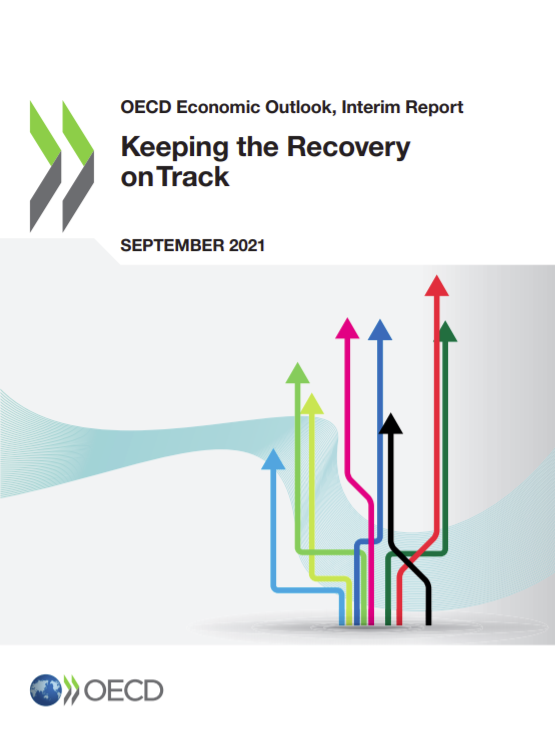
- Details
"The global economic recovery from the COVID-19 pandemic remains strong, yet too uneven. Uneven progress is increasing economic tensions that could undermine the recovery if not well managed by policymakers. Rising commodity and shipping prices and stretched supply chains as economies re-open rapidly are pushing up inflation everywhere but this is expected to be temporary. This Interim Report provides updates for G20 country projections made in the May 2021 issue of the OECD Economic Outlook"
Read more … OECD Economic Outlook, Interim Report September 2021

- Details
This paper aims to deepen current understanding of the state of play of green bonds that are financing climate resilience-related assets, projects, and activities (hereafter referred to as Green Bonds for Climate Resilience). The report contains an overview of the global state of play of green bonds with resilience-related use of proceeds, including highlights from select regions. The barriers for issuing resilience-related green bonds in four case study countries are identified and recommendations on how to address them are proposed. An analytical tool, the Green Bonds for Climate Resilience Capacity Assessment Framework, has been developed to inform this analysis and can in turn be used by public and corporate issuers to assess their internal capacity and external enablers to issue Green Bonds for Climate Resilience. Based on the analysis and findings, a roadmap to scale-up this promising tool is presented.
Read more … Green Bonds for Climate Resilience – State of Play and Roadmap to Scale

- Details
"Mitigation efforts require measures to address the underlying problem by slowing or stopping the rise in fossil fuel emissions, which could irreversibly and catastrophically raise the Earth’s temperature. Adaptation is needed to help people and governments withstand and minimize the ravages of climate change that are already here."

- Details
"While small- and medium-sized enterprises (SMEs) account for the vast majority of all formal jobs in developing countries, they often struggle to obtain the financing they need to grow. Indeed, access to finance remains one of the top five obstacles SMEs face in the regions where the European Bank for Reconstruction and Development (EBRD) invests. This raises the question of whether improving SME access to finance can help create additional employment. This Impact Brief draws on data from the recent EBRD, European Investment Bank and World Bank Group (EBRD-EIB-WBG) Enterprise Surveys and from clients of the EBRD’s Advice for Small Businesses (ASB) programme to estimate the impact of access to finance, and related advisory services, on employment.
Read more … Small business and job creation: Evidence from the EBRD regions
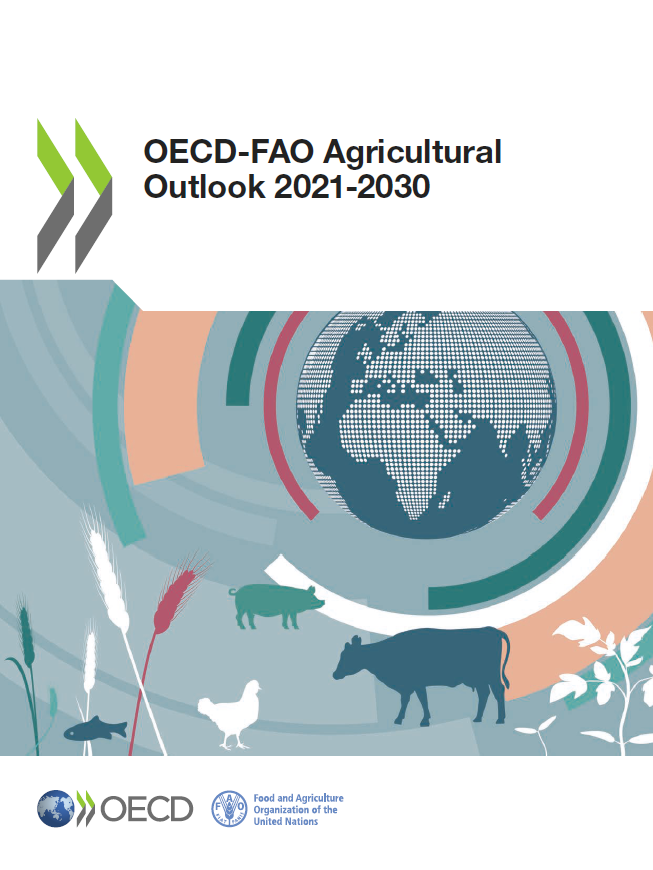
- Details
"The Agricultural Outlook 2021-2030 is a collaborative effort of the Organisation for Economic Co-operation and Development (OECD) and the Food and Agriculture Organization (FAO) of the United Nations. It brings together the commodity, policy and country expertise of both organisations as well as input from collaborating member countries to provide an annual assessment of the prospects for the coming decade of national, regional and global agricultural commodity markets.


